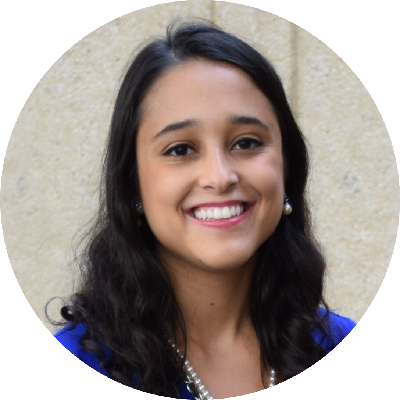
Claudia Carcamo
We discovered that certain cellular factors responsible for altering the way in which the genome is packaged can find their targeted packaging elements by sliding around of DNA like a train on a track, helping these genomic factors locate their targets, which, following the train analogy, are like the destination cities. This is important because without the use of sliding on DNA, the main mechanism by which these cellular factors would find their targets is via random collision in space, which would greatly reduce their targeting efficiency. As a collaboration between the labs of my thesis adviser, Taekjip Ha, and my co-mentor, Carl Wu, we studied the dynamics of several chromatin remodelers when bound to DNA using single particle tracking on optically stretched DNA. Our discoveries are important to the field of chromatin remodeler biology because they expanded the model for how specificity and directionality of nucleosome remodeling events are encoded in eukaryotic genomes. Remodelers active on promoter proximal nucleosomes have been shown to be recruited to nucleosome depleted promoter DNA via nonspecific affinity to free DNA. We show that once bound to this DNA, remodelers perform a 1D search on DNA, and upon encountering nucleosome substrates can exhibit highly processive activity with directionality and specificity that is biased by having encountered the nucleosome via a 1D search process.
Questions & Answers
Why did you choose Johns Hopkins for your work?
I chose to study at Johns Hopkins because the research community stood out to me as the most collaborative, kind and open of any school I had visited for recruitment. I owe my success to the support I received from the Hopkins community.
What does receiving this award mean to you personally and professionally? Do you have any connection with the particular award you received?
I feel incredibly honored to have received the David Yue Research Award. It is very clear from having read accounts by those fortunate enough to have gotten to know Professor Yue that he made a deep impact on the Johns Hopkins community for having been an outstanding mentor, teacher and scientist. I feel inspired and empowered by this award to challenge myself to craft even more engaging and clear scientific presentations and hope I should be so fortunate as to mentor a future generation of scientists one day. As a young biophysicist myself, I look up to David Yue as an accomplished and highly regarded biophysicist and am truly honored and humbled to be acknowledged with an award named in his memory.
What contributed to your project’s success?
I received a great deal of support during my Ph.D. from my faculty mentors, Taekjip and Carl, and from other lab members, without which my success wouldn’t have been possible. A former postdoctoral researcher, Matthew Poyton, initially had the idea of investigating SWR1 chromatin remodeler dynamics on DNA and introduced me to this project. A recent Ph.D. graduate of Carl Wu, Dr. Jee Min Kim, then took the initiative of expanding work I had done on a different remodeler to study diffusion of RSC and ISW2 on DNA. Without Jee Min, the work I submitted for the Young Investigators’ Day award would not have been possible. She and I are joint first authors of a manuscript that we are currently preparing for submission on this topic. I am also thankful for the BCMB (biochemistry, cellular and molecular biology) program and to former deputy director, Arhonda Gogos, for supporting me as I searched for my thesis laboratory. I was funded by an NSF GRFP (National Science Foundation graduate research fellowship program) fellowship. Last, but not least, my husband’s tireless support was the added push I needed to persevere though many failed experiments.
What thoughts do you have about Young Investigators’ Day itself, as a celebration of the roles student and fellows play in research at Johns Hopkins?
I feel very appreciate for the Young Investigators’ Day celebration of young researchers. This award is creating an invaluable network for award recipients, helping connect outstanding young Hopkins researchers, both present and past.
What has been your best/most memorable experience while at Johns Hopkins?
My most memorable experience while at Johns Hopkins has been a personal one. In 2019, I met an outstanding young scientist, Alberto Marin Gonzalez, whom I married in the fall of 2022. Amazingly, he was also recognized with a Young Investigators’ Day award this year.
What are your plans over the next year or so?
My plan over the next year is to start postdoctoral research in the Boston area, where I will be moving in August. I am interested in expanding my skillsets further and hope to write successful applications for postdoctoral funding.
Tell me something interesting about yourself that makes you unique. Do you have any special hobbies, interests or life experiences?
Both of my parents immigrated to the U.S. when they were teenagers — my mother from Italy and my father from Colombia. I connect very deeply with the immigrant experience and can speak both Italian and Spanish fairly well. I spent most of my childhood with my maternal grandmother, with whom I learned to speak a dying dialect of Italian from Calabria. With her, I also developed a love of cooking delicious food. I have one brother, David, whom I am very proud of and who is in a doctoral program in theoretical physics at Yale University.